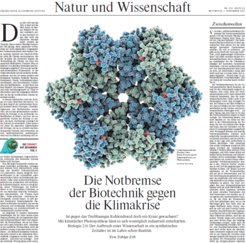Synthetic biology and climate change in Frankfurter Allgemeine Zeitung
A feature article by Tobias Erb

Tobias Erb, director at the Max Planck Institute for Terrestrial Microbiology in Marburg and project leader in MaxSynBio published a major feature article on the potential of synthetic biology for the fight against climate change in the renowned daily newspaper Frankfurter Allgemeine Zeitung on 1 November 2017. In this article, Tobias Erb presents the so-called CETCH cycle as an exemplary strategy in synthetic biology to address contemporary environmental issues. The CETCH-cycle is a designed and synthetic metabolic biochemical cycle which binds CO2. The advantage of the CETCH-cycle is that it is much more efficient than natural (photosynthetic) cell cycles. In order to increase the efficiency it was necessary to combine natural enzymes from different organisms as well as completely synthetic enzymes in a bottom-up approach of synthetic biology. Through this research work and the respective feature article Tobias Erb helps to show that synthetic biology is not only interesting for fundamental research but has a promising application potential for real life problems. Furthermore, the reader of the article is made familiar with the general concepts of synthetic biology.
Read the full article in the Frankfurter Allgemeine Zeitung (Paywall).
